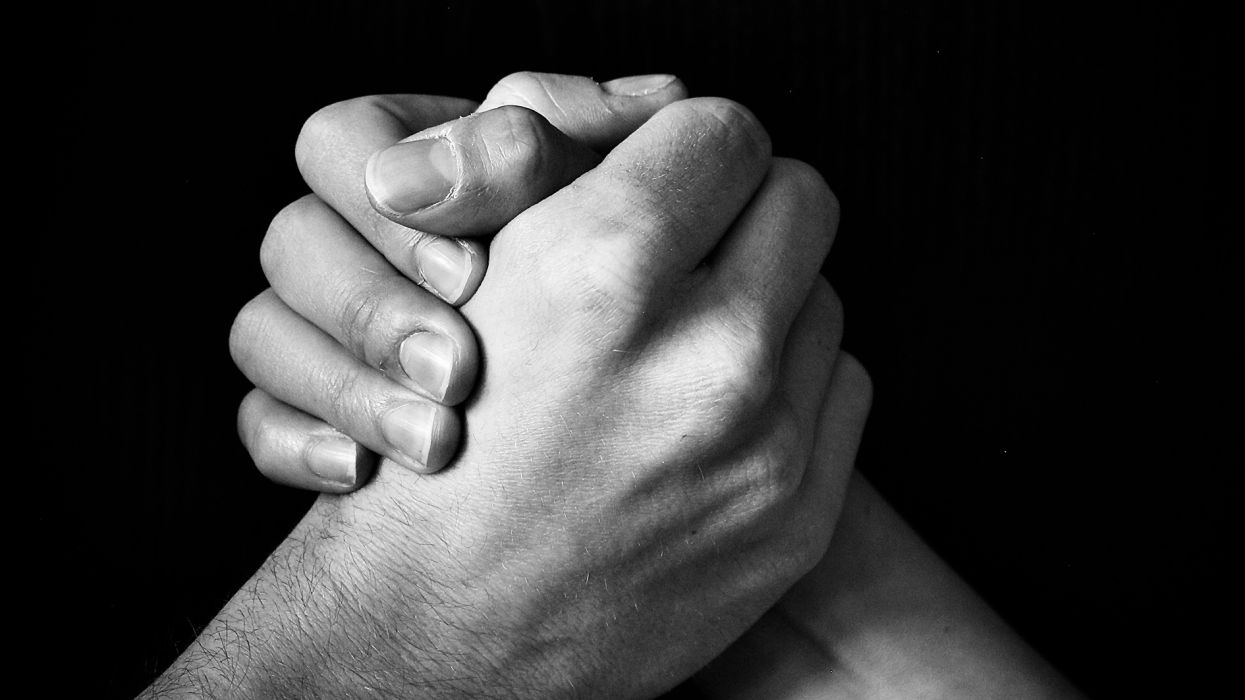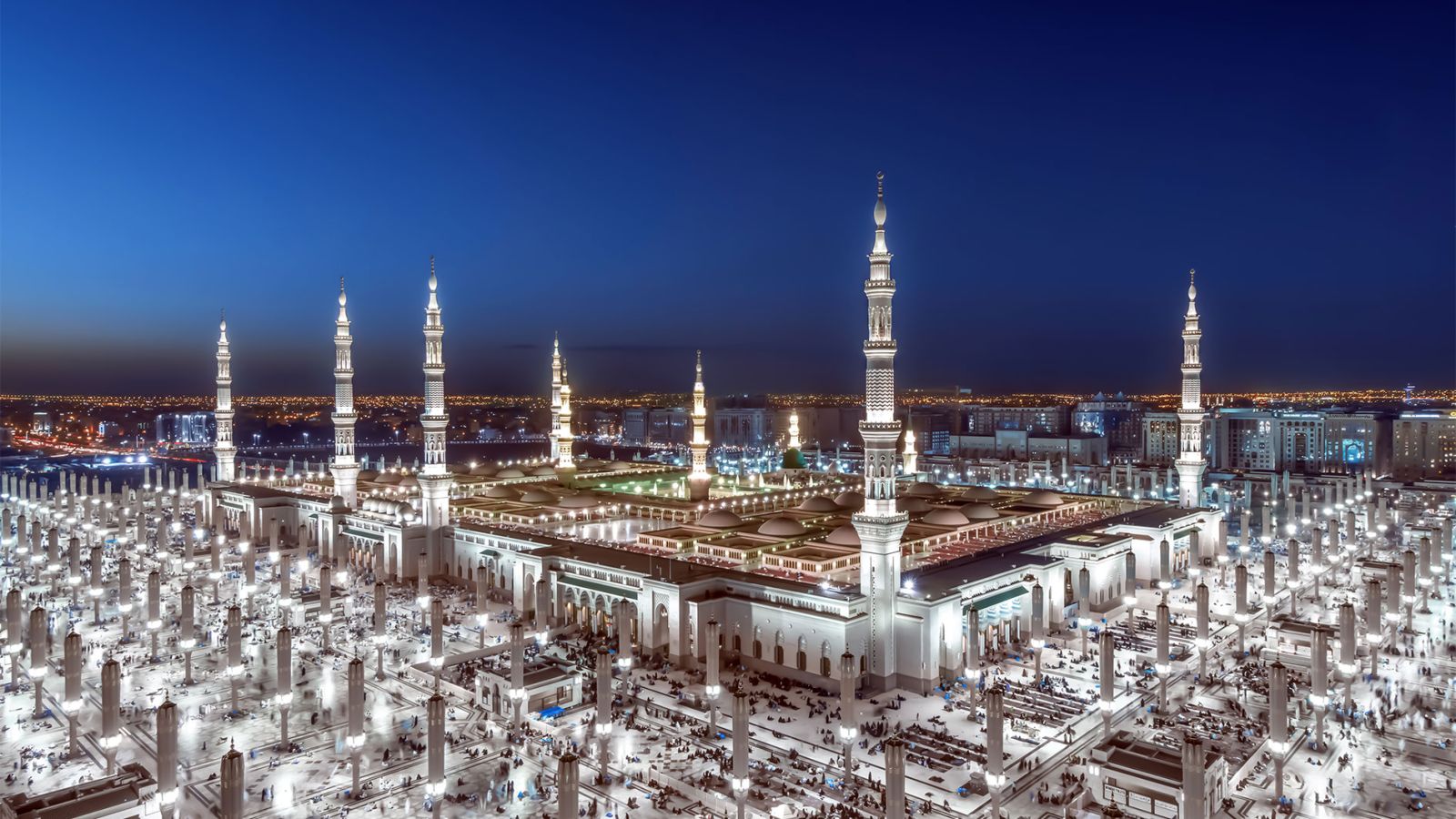Brotherhood in Islām
Shaykh ʿAbd al-Salām ibn Burjiss

The Shaykh said that he is very very pleased to be here again, and said perhaps this is his fifth time he’s been here and seen the brothers and it gives him great pleasure to sit here again with the brothers; and he made du’ā that may Allāh guide us and put us on the straight path, and may Allāh keep us on that straight path and not send us towards the path of destruction and misguidance.
He said that today’s word will be upon the topic of Brotherhood in Islām, and the Shaykh said that what brings us together, or what brings the Mu’min together is al-īman, and he said that all Mu’mins are brothers, and he said that brotherhood is one of the strongest ties of kinship; and he mentioned the āyah,
إِنَّمَا ٱلۡمُؤۡمِنُونَ إِخۡوَةٌ۬
“Verily, indeed the Mumins are brothers”
[Hujurāt: 10]
So he said that the brother is close to his brother, and he helps him through his hardships and he will lower his wing for him and he will pull him through in times of hardship; and then the Shaykh mentioned the āyah that Allāh (subhānahu wa taʿāla) said,
فَسَوۡفَ يَأۡتِى ٱللَّهُ بِقَوۡمٍ۬ يُحِبُّہُمۡ وَيُحِبُّونَهُ ۥۤ أَذِلَّةٍ عَلَى ٱلۡمُؤۡمِنِينَ أَعِزَّةٍ عَلَى ٱلۡكَـٰفِرِينَ
“He will send a people who will love Allāh, and He will love them, and they will kind and caring towards the mu’min, and strong and severe against the Kuffar.”
[Al-Mā’idah: 54]
So the Shaykh mentioned that the Mu’minūn or the believers are like a building, that each individual brick of that building supports one another, and he said that this is an example of how the Mu’mins are together in unity in their sympathy and caring towards one another, and he mentions also, the comparison that the Prophet (ṣallallāhu ʿalayhi wa-sallam) gave that,
‘The Muʿminūn are like a body, one if one part of that body feels pain, then the other parts of that same body will feel pain, likewise.’
The Shaykh said, to prove the great position that brotherhood has in Islām, he mentioned the incident where the Prophet (ṣallallāhu ʿalayhi wa-sallam) first came to Madīnah, that the first task he got involved with was the building of the Masjid, and then after that, the Prophet (ṣallallāhu ʿalayhi wa-sallam) joined the Muhājirūn and the Anṣār together in brotherhood, and this was the second task amongst the first tasks he did after hijra; and he said this brotherhood, was the highest thing at that time for the people to do, it was like the pinnacle on the pyramid, it was the height of sacrifice, the height of patience for these people; and he said that he a took a brother Muhājir with a brother Anṣār, and the sacrifice that the brother made was that he brought him into his house and made him live with him in his house, and he gave half of his wealth to this person, to the Muhājir, and if this person had more than one wife, then he would divorce his wife and offer the wife to his brother, the Muhājir; and he said, what was greater than this was that at the beginning of Islām, this type of brotherhood or kinship was a reason that inheritance was allowed in this type of relationship, that the Muhājir, he could inherit from his brother Anṣari if he died; but later on in Islām, this became abrogated, and the inheritance became for those that had the pure family kinship and ties and not for the brother that was joined in the beginning between the Anṣāri and the Muhājir. The Shaykh said that this shows the greatness of brotherhood in Islām
The Shaykh went on to say, that there are many aḥadīth from the Prophet (ṣallallāhu ʿalayhi wa-sallam), that show us that Allāh (subhānahu wa taʿāla) loves the one who loves his brother for the sake of Allāh, and for nothing else, and he said that this was the strongest ties of īman; so the Shaykh said, ya’ani, that this person he has a relationship with his brother for Allāh (subhānahu wa taʿāla’s) sake only, he does not look towards him for any worldly or wealth gains, and doesn’t look for any benefits that will arise from his relationship with his brother, but rather he looks towards his brother seeking reward and seeking benefit from Allāh (subhānahu wa taʿāla); and then the Shaykh mentioned the ḥadīth Qudsi, where Allāh (subhānahu wa taʿāla) says,
‘My love is compulsory upon those people that love for My Sake,’
The Shaykh said that these people will be sitting on thrones of pearls, and will have lofty and high places in the Eyes of Allāh (subhānahu wa taʿāla), and this is the high position that Allāh (subhānahu wa taʿāla) gave brotherhood in Islām.
Then the Shaykh said, that why did Islām concentrate and give so much emphasis to brotherhood and this is the next topic he will now address. The Shaykh said that through brotherhood, Islamic dā’wah is possible, because this brotherhood it destroys all types of differing and racism; racism that could arise through tribalism, or through prejudice or through language or places you live; so Islām concentrated, or placed such an importance on brotherhood to destroy all of these negative factors, to destroy all of these prejudices, and he said that this love that will be grown through Islām and īmān will lead to strength and will lead to great power, and he said if you look at the Ṣahābah, it was only their love that they had for one another through Islām and īmān, which gave them the ability to overpower and become conquerous over the Persians and the Romans, and so he said, they were like a single hand, a strong hand and like a building, and Allāh (subhānahu wa taʿāla) warned against differing and against splitting, and against enmity and hatred towards one another, and the Shaykh mentioned the āyah,
وَلَا تَنَـٰزَعُواْ فَتَفۡشَلُواْ وَتَذۡهَبَ رِيحُكُمۡ
“Do not differ and do not argue with one another, so that you will
become weak and your strength will depart.”
[Anfāl: 46]
The Shaykh went on to say that Islām warns away from argumentation and disputation, upon other than the truth, this is apparent and clear for those people who reflect upon the many āyat and ḥadīth which come supporting this, and he mentioned the ḥadīth, the Prophet (ṣallallāhu ʿalayhi wa-sallam) said,
‘Verily the Shayṭān (Iblīs) gives up hope that the people that pray (muṣallūn) will worship him in the jazīrah al-ʿArab, rather he is taken to argumentation and differences between the people.’
So he said look how Shayṭān gave up hope that they will worship him in the Jazeerah, then he started in the way of disputation and ikhtilāf, to get between the Mu’minūn, to get between the believers, and he said when this is established, this opens up the door for people to follow their whims and their desires and to fall into bidʿah and to misguidance, and he said that it will enter some of the ‘ibād into a way of worshipping other than Allāh (subhānahu wa taʿāla). So he said that Islām laid down some guidelines and some qawā’id on how we should cooperate with you brothers and how we should cooperate with those people that we love for the sake of Allāh and he said, none of us are free from making mistakes, we are not innocent, he mentioned the ḥadīth,
‘Every son of Ādam makes mistakes, and the best of those that make mistakes are the ones that make taubah’
He said that we are all human, we are all bashar, and the best of you is the one who will be able to take and carry the burden of the ill mannered and the evil that will come from this brother and be patient with that. He mentioned the āyah,
فَمَنۡ عَفَا وَأَصۡلَحَ فَأَجۡرُهُ ۥ عَلَى ٱللَّهِۚ
“The one who forgives, his reward is with Allāh”
[Shūrá: 40]
He also mentioned the ḥadiṭh about the two people that differ with each other, that the best of them is the one who starts with the Salām, the Shaykh said, after if you’ve tried to make, or if the mashākil or the problems do not finish, and there is no brotherhood, Allāh (subhānahu wa taʿāla) has sent His Book and the Sunnah of the Prophet (ṣallallāhu ʿalayhi wa-sallam) with all that is required by the people in the benefits and in the affairs of the dunyā and the affairs of the dīn. So he said that the criterion, or the drawing line, is present and is mawjūd in these Books, in the Sunnah and in the Qurʾān. He said that if you do not find the solution after you’ve practised gentleness and having a forgiving nature and you look over these things, if you do not find the solution after that, then you resort to the next action which is, you go to the Qāḍhi and you ask for a judgement and you give up all of your affairs to Allāh (subhānahu wa taʿāla) and the Sunnah of the Prophet (ṣallallāhu ʿalayhi wa-sallam); so if a proper Qāḍhi, a virtuous Qāḍhi comes along and he decides that the truth is with ‘so-and-so’ and not with ‘so-and-so’, then this cuts all of the lines of argument and should stop any sort of disputation after this judgement has been made; and he said that Shayṭān, may Allāh curse him, is adamant in bringing farq and bringing ikhtilāf and bringing disputation and ikhtilāf and differences between the Muslims and the Mu’mins, and he said that Shayṭān is quite adamant in causing enmity and hatred and instilling this in the heart of the Mu’mins, and the Shaykh said, that ḥajr of a Muslims is like spilling his blood, so he said look how Islām has made ḥajr and made a similitude as if it is like spilling that person’s blood.
The Shaykh said I hope that Allāh (subhānahu wa taʿāla) will grant us the tawfīq and the ability to act upon what we have heard, and now because the time is short we will start with some questions….
[The lecture was then concluded with a highly beneficial Q&A session of a miscellaneous nature]












